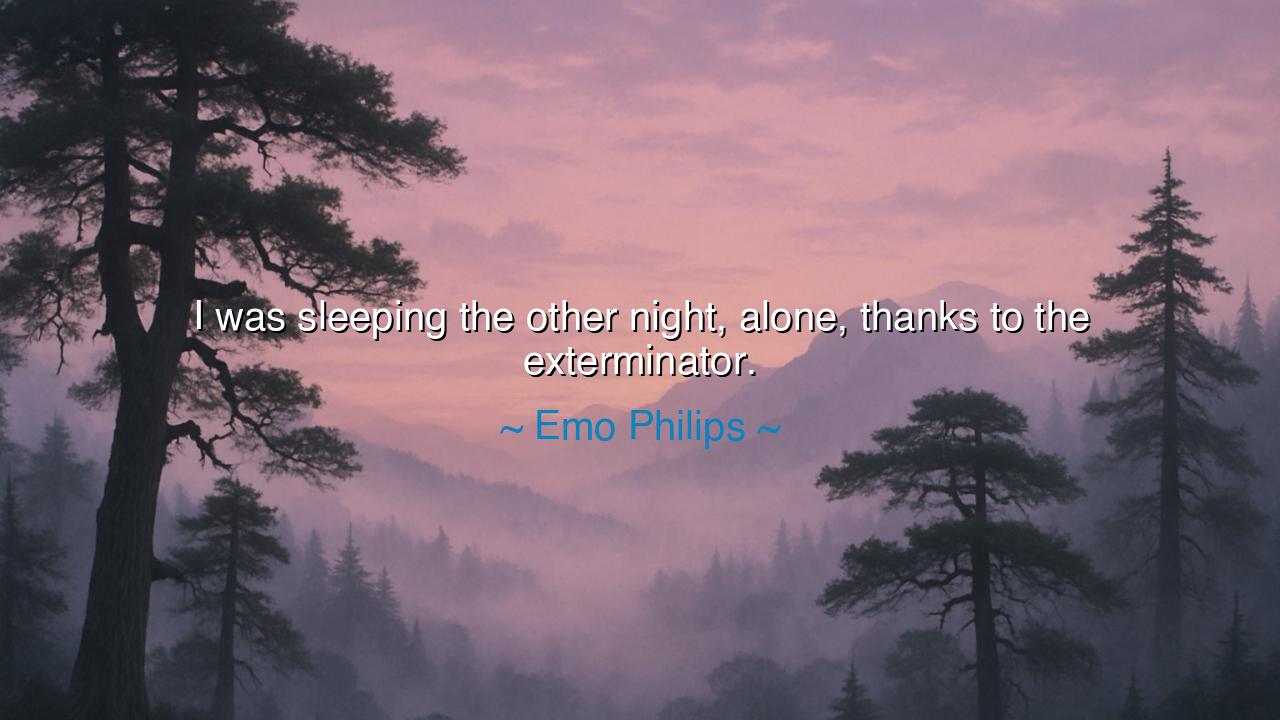
I was sleeping the other night, alone, thanks to the






“I was sleeping the other night, alone, thanks to the exterminator.” — thus quipped Emo Philips, the comedian and philosopher of absurdity, whose wit dances on the delicate line between humor and truth. At first glance, his words sparkle with comedy, light and fleeting as laughter itself. Yet beneath their playful surface lies a hidden mirror, reflecting the human condition — the eternal struggle between solitude and companionship, between chaos and control, between the desire for peace and the discomfort of emptiness. Like many of the sayings of jesters and fools, this line conceals a wisdom disguised as folly, a truth spoken through the mask of laughter.
Emo Philips, known for his surreal humor and childlike wonder, often framed profound truths within the absurd. In this quote, he takes what seems to be a mundane situation — being alone at night after an exterminator has cleared the pests — and transforms it into a reflection on loneliness and gratitude. The humor arises from the twist: he is “alone” not because of heartbreak or isolation, but because someone has rid his home of unwanted company — the insects, the invaders, the small life that shared his space. The irony lies in this — that solitude, often dreaded, here comes as a gift, a moment of peace won through confrontation and cleansing.
To the wise ear, this jest speaks of more than pests. The exterminator becomes a symbol of all those forces — within and without — that purge the distractions, the noise, and the infestations of our spirit. Each of us, in our own way, must call forth such an exterminator from time to time: the act of self-reflection that drives out fear, the courage that banishes deceit, the discipline that clears the mind of clutter. When those inner pests are gone, we may find ourselves alone, perhaps even uncomfortably so — yet it is a holy solitude, a space finally free for rest and renewal. Emo’s humor, though dressed in whimsy, touches upon this timeless truth: sometimes the very emptiness we dread is the doorway to peace.
Consider the tale of Diogenes the Cynic, that wandering philosopher who lived in a barrel and called himself richer than kings. When Alexander the Great came to visit him, asking what he might grant such a wise man, Diogenes replied, “Stand out of my sunlight.” He had exterminated from his life every unnecessary attachment — wealth, comfort, vanity — and stood alone, yet utterly free. Like Emo’s jest, Diogenes’ answer is humorous, but also profound: solitude is not always a punishment; it can be liberation. It is the peace that follows the clearing away of what no longer serves.
The line also carries a subtler insight into the nature of humor itself. Laughter often arises from paradox — the union of opposites, the collision of meaning and nonsense. Emo Philips understood that comedy is philosophy in disguise. His “thank you” to the exterminator is both sincere and ironic: he rejoices in the solitude he once might have feared. In this way, humor becomes a kind of wisdom — the ability to look upon life’s contradictions not with despair, but with amusement, and thus to find peace even in absurdity. For in laughter, the soul learns to breathe again, even amid chaos.
There is also, in these few words, a reflection on gratitude. How often do we fail to see the blessings in what seems inconvenient or strange? The exterminator, who destroys life, gives the gift of calm. The solitude that might feel cold becomes the space for rest. Life, too, often works this way — through loss we find clarity, through endings we find peace. Emo’s joke reminds us to look beyond appearances, to see the unexpected mercy hidden in discomfort. Even when we find ourselves alone, we might pause and give thanks — for perhaps the pests have gone, and the quiet has returned to our hearts.
Lesson: Learn to welcome the moments of solitude that life grants you, even when they arrive unbidden. See them not as absence, but as cleansing — as the work of your own inner exterminator, driving out what clings, what distracts, what diminishes your peace. Laugh, as Emo Philips teaches us to laugh — not in denial, but in understanding. The wise man and the fool both live in solitude, but the wise man rejoices in it. When next you find yourself alone, whether in your room or in your thoughts, smile and give thanks. For perhaps life, too, has sent an exterminator to clear the way for your rest.
Thus, Emo’s playful line becomes an allegory of wisdom: that laughter and loneliness, when embraced with grace, are companions, not enemies. The comedian, like the philosopher, teaches us to look upon life’s absurdities not with fear, but with wonder. In the end, to be “alone thanks to the exterminator” is to dwell, for a time, in the blessed stillness that follows the storm — where, at last, one can sleep in peace beneath the quiet stars.






AAdministratorAdministrator
Welcome, honored guests. Please leave a comment, we will respond soon